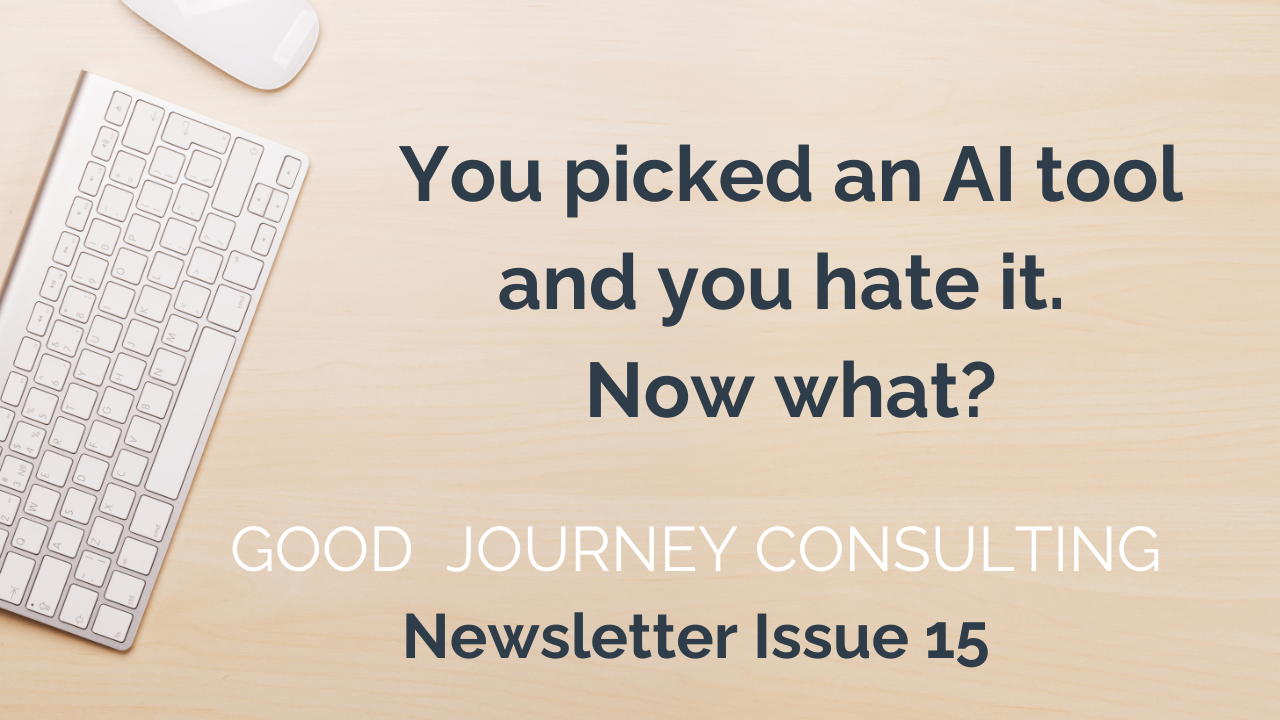You picked an AI tool and you hate it. Now what?

Issue 15
Who hasn’t made a purchase they later regret? It happens to us all at some point. You think you know what you’re getting when you hand over your money, but the product doesn’t match the promise as you understood it. If you’ve picked an AI tool for your practice and you’re less than impressed with it, I want to help you quickly get to the bottom of what went wrong so you can get back on track.
Before abandoning your current AI tool, it’s worth considering if there is any way your efforts to date could be salvaged. You’ve already made an investment with both your money and your time. Perhaps other members of your organization have made those investments along with you. What is the gap between what you thought the tool would do and your real-life experience using the tool? Does the AI company offer any user support that hasn’t been utilized yet? Could additional user training transform your organization’s experience with this tool? Is it a type of AI tool where output quality might be improved through better prompt engineering? If so, do you anticipate that the time you would need to invest in learning legal prompt engineering would be likely to result in a significant enough improvement in the tool’s performance?
If not, it may be time to cut your losses and move on.
How to Troubleshoot What Went Wrong and Move Forward
If your investment in your first AI tool can’t be salvaged, here are some more questions to help pinpoint what went wrong so that you can have a better outcome with your next AI tool adoption:
- Did you take time to develop your AI competency so that you knew you could align your AI use with your professional responsibilities? If you haven’t done so already, make sure to take time to develop foundational knowledge about AI and its capabilities, limitations, and pitfalls.
- Did you investigate where an AI solution can make the biggest impact for your organization? Using your organization’s available data to understand your organization’s specific technology problems that could potentially be solved with AI and prioritizing those problems is critical to ensure you get the most bang for your buck.
- Did you perform a risk assessment in relation to the tool? Assessing the risks associated with an AI tool should be a prerequisite to using the tool within your legal practice.
- Was the tool compatible with the technology culture of your organization? Would you describe your organization as receptive or resistant to new technology tools? Was the tool hard to learn or otherwise hard to use? Did the tool integrate with any other technology tools already in use in your organization?
- Do you have consensus within your organization about what was lacking about the first tool? It’s worthwhile to solicit feedback from the other users so that they feel their concerns have been heard and to increase their willingness to try another tool in the future.
- Did you take the time to adequately test the tool before adopting it? Testing an AI tool during your period of evaluation is the best time to gather data about whether the tool works as expected.
I hope these questions help you move forward if you’ve been feeling stuck and unsatisfied with your current AI tool. If you’re experiencing regret over an AI tool you’ve adopted, I’d love to know more. Please feel free to send me a message at [email protected] and tell me more about your experience.
Thanks for being here.
Jennifer
Good Journey Consulting
P.S. When you’re ready to move forward on evaluating other AI tools, consider whether you could do it more efficiently with A Lawyer’s Practical Guide to AI. Chapter 5 of the guide includes a detailed step by step process for evaluating and implementing AI tools, and a directory of over 150 legal industry AI tools organized by capabilities, practice area, and integrations with other AI tools. You can learn more about the guide here.
Stay connected with news and updates!
Join our mailing list to receive the latest legal industry AI news and updates.
Don't worry, your information will not be shared.
We will not sell your information.

